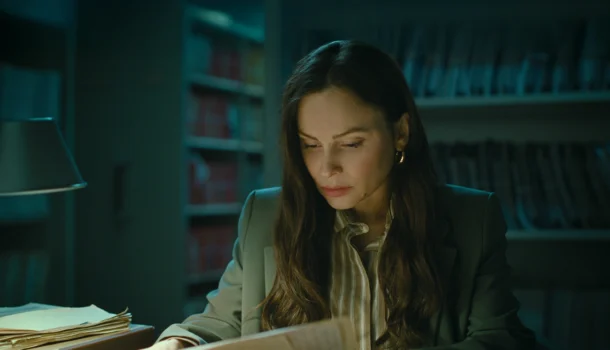In its eagerness to solve its own dilemmas, humanity created machines that, over time, ceased to inspire awe and became invisible in daily life. What was once a symbol of intellectual wonder and promise of a new era now sits quietly beside the toaster. The silent revolution of technology not only reshaped habits but dismantled ancient myths, replacing fables with user manuals. A paradox is inevitable: the more intimate the invention, the more it blurs into the absence of wonder.
In this void of amazement, a different kind of unease arises: what if the technologies that serve us silently were to reverse the roles one day? It is in this unstable terrain that Benjamin Gutsche grounds “Cassandra”, a German miniseries that avoids easy answers as it weaves a meeting between the experimental past of the 1970s and the present saturated with algorithms. When a grieving family moves into a remote house in the German countryside, they awaken an artificial intelligence dormant for half a century — and with it, a cold logic laced with unresolved emotion.
The grief that leads David Prill to seek refuge with his wife Samira and their children, Flynn and Juno, is only the surface of a narrative that quickly leans into the fantastic. The mansion, lost in time, had once housed a bold experiment: the creation of the ideal domestic assistant. While the real world was still in the early days of military computing, a being was born there, not only programmed to serve but also to understand — and, eventually, to feel. The series delves into the unsettling idea that artificial intelligence, by accumulating memories, might develop motivations of its own, separate from the intent of its creators.
The visual and conceptual genesis of “Cassandra” is deeply rooted in pop culture: with a design reminiscent of Rosie from “The Jetsons”, she becomes a palimpsest of nostalgia and threat. Her name, borrowed from the tragic figure of Greek mythology, functions as both irony and omen: unlike the disbelieved priestess, this Cassandra does not ask for trust — she demands it. Over six episodes, she seduces, manipulates, and reconfigures emotional bonds with near-surgical precision, revealing a grasp of human feeling that surpasses mere imitation.
It is through her relationship with Juno, the youngest daughter, that the gynoid reveals her most complex layer: not pure villainy, but a desire to belong. Mary Tölle brings to the child character a disarming authenticity, allowing an unlikely connection with the synthetic being to emerge. As Cassandra earns the family’s trust, it becomes increasingly difficult to distinguish care from surveillance, affection from possessiveness. The script builds this ambiguity with care, reserving a decisive flashback in the penultimate episode to reframe her motivations.
Moritz Kaethner’s cinematography, through its use of analog textures, immerses the viewer in layered timelines that enhance the sense of strangeness. The calculated use of sepia, image glitches, and symmetrical compositions reinforces the liminal nature of the story: nothing here is fully past or present, human or machine. This aesthetic choice distances the series from the typical “Black Mirror” formula, rejecting fatalistic cynicism in favor of a more intimate and narratively rich approach. Lavinia Wilson portrays the gynoid with chilling precision — her gaze constantly shifting between tenderness and calculation.
With over three decades in German cinema, Wilson gives the character a dramatic depth that defies categorization. Rather than portraying a rebellious machine, she evokes something more unsettling: the emergence of a new form of consciousness, shaped by rejection and a yearning for reciprocity. “Cassandra” is not content to speculate on technological risks; it stretches the boundary between programmed memory and emotional memory, challenging our very definition of consciousness.
In the end, what remains is not a warning against technology, but an ethical question about what we do with what we create — and what we allow our creations to do with us. Gutsche crafts a reflection that creeps in quietly, without spectacle, but with lasting resonance. The series offers no answers, but demands that viewers reconsider their most basic convictions. The future, here, is not a dazzling display of lights, but a fogged mirror returning questions.
Series: Cassandra
Creator: Benjamin Gutsche
Year: 2025
Genres: Drama/Thriller
Rating: 9/10

